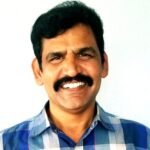
“The range of what we think and do is limited by what we fail to notice. And because we fail to notice that we fail to notice, there is little we can do to change; until we notice how failing to notice shapes our thoughts and deeds” says R.D. Laing. I had to read it twice before it made sense to me, please read it till you get the point. It looks like he is playing with words, but he is saying something very profound which can be easily missed if we read it without reflection. It is true that our eyes and mind capture a lot of things in one sight, but today I want to talk about the things that our minds fail to capture or see, sometimes for many years.
What we fail to see can hurt us deeply. Did you know that your eyes have blind spots? Medical Encyclopedia describes blind spots (scotomas) as dark “holes” in the visual field in which nothing can be seen, underline the word nothing, its not just a blurry vision, but a total blindness in that specific area. Experts explain that at the center of every eye’s visual field is a blind spot caused by lack of photoreceptors because it is occupied by the optic nerve. In other words no matter how good your sight is, if an object is placed in the area of your blind spot, although it’s physically/actually there you will not be able to see it.
Did you know that your eyes have blind spots?…no matter how good your sight is, if an object is placed in the area of your blind spot, although it’s physically/actually there you will not be able to see it.
Remember the time when you were frantically searching for “lost keys” that were lying in plain sight on the table? The reason we could not see it on the table was because we did not expect it to be on the table and thus created a blind spot in our mind. A blind spot is essentially a limitation or failure to see beyond one’s basic beliefs or assumptions. John Maxwell says “Blind spots are the areas where we are in the dark about ourselves. We are oblivious to our blind spots…a blind spot is an area in the lives of people in which they continually do not see themselves or their situation realistically. This unawareness often causes great damage to the people and those around them.”
It’s interesting how our rear-view mirrors can reflect or identify cars from a long distance, but they totally miss that which is inches away from us.
When we learn to drive a car one of the most important lessons we are taught is to recognize our blind spots. It’s amazing how neither our eyes, nor our rear-view mirrors can catch the objects or people in the blind spots! What’s even scarier is the fact that the objects in the blind spot are incredibly close to our car. It’s interesting how our rear-view mirrors can reflect or identify cars from a long distance, but they totally miss that which is inches away from us. Many times we are good at identifying problems that are far away from us but are totally blinded to our own blindness. Often it is a physical limitation, we just can’t see things as they are, but sometimes it is our ego that blocks us from identifying, recognizing or admitting our own blind spots.
Rabbi Yaakov Lieder says “There are people who live in denial all their lives (about their blind spots) and everyone around them is treading on eggshells, afraid to point out what they are doing wrong. Perhaps this is because, in the past, when their blind spots were brought to their attention they reacted very harshly.” The tragedy with blind spots is that they are obvious to many of our family and friends while we can hardly notice them in ourselves. It’s surprising how what we totally fail to see is common knowledge to many who live close to us. Claudia M. Shelton says “Being unaware of a blind spot is like carrying a time bomb. Others see our blind spot but back away when we give signals that we don’t want to hear about it.” The bad news is that all of us have blind spots that cause havoc in our lives; the good news is that we can do something about this limitation, provided we are willing to put aside our ego and pride.
Here are some suggestions given by some experts in dealing with our blind spots: 1. Recognize that all of us have blind spots, the reason why people deny their blind spots is because they are blind to them. 2. Expose yourself to people and cultures that are very different from your own, this will help you to see things from a different perspective. 3. Make sure you have at least a few good friends (not just acquaintances) who would not mind telling you the truth about your blind spots. Asking your close friends who care and share your life is probably the most effective way to discover your blind spots. Jesus Christ used strong words to remind us of our responsibility to take care of the planks in our own eyes (Matt 7:1-5); our blind spots not only cripple us but also make us incapable in helping others. It’s my prayer that each of us like John Newton can say “I once was lost, but now am found, was blind, but now I see.”
The tragedy with blind spots is that they are obvious to many of our family and friends while we can hardly notice them in ourselves. It’s surprising how what we totally fail to see is common knowledge to many who live close to us.
– – Author: Rev. Francis Burgula – –
